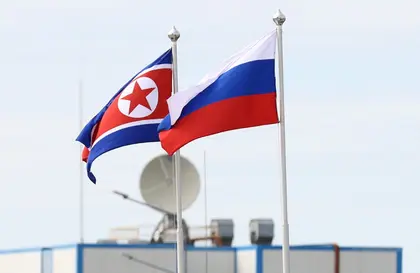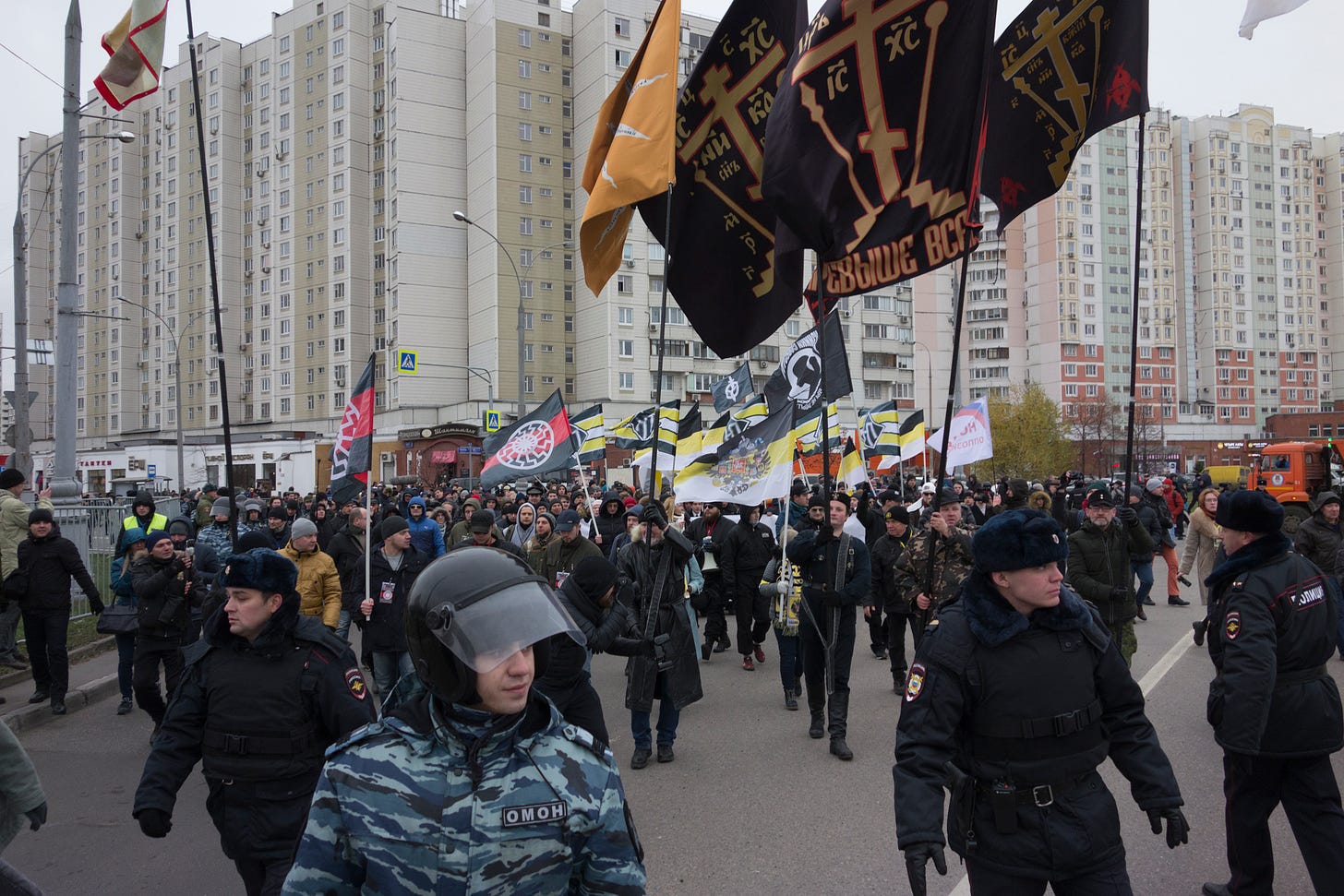CHEEKY HEADLINE
Putin’s Pyongyang Arms Supplier Calls US, Japan, and South Korea ‘Asian NATO'
North Korea condemns drills by Washington, Tokyo, and Seoul and warns of “fatal consequences” for what Kim Jong Un thinks is a Pacific version of the Atlantic Alliance.
by AFP | June 30, 2024,

South Korea has also grown anxious over the North's warming relations with its isolated neighbor Russia.
North Korea is accused of breaching arms control measures by supplying weapons to Russia to use in its war in Ukraine, and Russian President Vladimir Putin held a summit with leader Kim Jong Un in Pyongyang this month in a show of unity.
North Korea condemns drills by Washington, Tokyo, and Seoul and warns of “fatal consequences” for what Kim Jong Un thinks is a Pacific version of the Atlantic Alliance.
by AFP | June 30, 2024,

Russian and North Korean flags waving at the Vostochny Cosmodrome in Amur region on September 13, 2023, during the meeting of Russian and North Korea's leader. Artem Geodakyan / POOL / AFP
North Korea denounced on Sunday joint military drills by South Korea, Japan and the United States, calling them an "Asian version of NATO" and warning of "fatal consequences".
It comes a day after the allies wrapped up three-day exercises, dubbed "Freedom Edge", in ballistic missile and air defenses, anti-submarine warfare and defensive cyber training.
US, South Korean and Japanese leaders agreed at a trilateral summit last year to conduct annual drills as a sign of unity in the face of North Korea's nuclear threats and China's rising regional influence.
"We strongly denounce... provocative military muscle-flexing against the DPRK," Pyongyang's foreign ministry said in a statement carried by the state-run KCNA news agency Sunday, referring to the North's official name.
"The US-Japan-ROK relations have taken on the full-fledged appearance of an Asian-version NATO," it said, warning of "fatal consequences".
"The DPRK will never overlook the moves of the US and its followers to strengthen the military bloc."
The latest joint drills involved Washington's nuclear-powered aircraft carrier USS Theodore Roosevelt, Tokyo's guided-missile destroyer JS Atago, and Seoul's KF-16 fighter jet.
Pyongyang has always decried similar combined exercises as rehearsals for an invasion.
The two Koreas have meanwhile been caught in a tit-for-tat balloon campaign in recent weeks, with Pyongyang sending trash-filled balloons southwards in retaliation to similar missives sent northwards from the South carrying pro-Seoul propaganda.
North Korea denounced on Sunday joint military drills by South Korea, Japan and the United States, calling them an "Asian version of NATO" and warning of "fatal consequences".
It comes a day after the allies wrapped up three-day exercises, dubbed "Freedom Edge", in ballistic missile and air defenses, anti-submarine warfare and defensive cyber training.
US, South Korean and Japanese leaders agreed at a trilateral summit last year to conduct annual drills as a sign of unity in the face of North Korea's nuclear threats and China's rising regional influence.
"We strongly denounce... provocative military muscle-flexing against the DPRK," Pyongyang's foreign ministry said in a statement carried by the state-run KCNA news agency Sunday, referring to the North's official name.
"The US-Japan-ROK relations have taken on the full-fledged appearance of an Asian-version NATO," it said, warning of "fatal consequences".
"The DPRK will never overlook the moves of the US and its followers to strengthen the military bloc."
The latest joint drills involved Washington's nuclear-powered aircraft carrier USS Theodore Roosevelt, Tokyo's guided-missile destroyer JS Atago, and Seoul's KF-16 fighter jet.
Pyongyang has always decried similar combined exercises as rehearsals for an invasion.
The two Koreas have meanwhile been caught in a tit-for-tat balloon campaign in recent weeks, with Pyongyang sending trash-filled balloons southwards in retaliation to similar missives sent northwards from the South carrying pro-Seoul propaganda.
South Korea has also grown anxious over the North's warming relations with its isolated neighbor Russia.
North Korea is accused of breaching arms control measures by supplying weapons to Russia to use in its war in Ukraine, and Russian President Vladimir Putin held a summit with leader Kim Jong Un in Pyongyang this month in a show of unity.










 Independent candidate Shockat Adam (3rd) joins other candidates who are running for MP in Leicester South at a YouElect event on June 13, 2024. [Ruma Ali]
Independent candidate Shockat Adam (3rd) joins other candidates who are running for MP in Leicester South at a YouElect event on June 13, 2024. [Ruma Ali]






.png)



